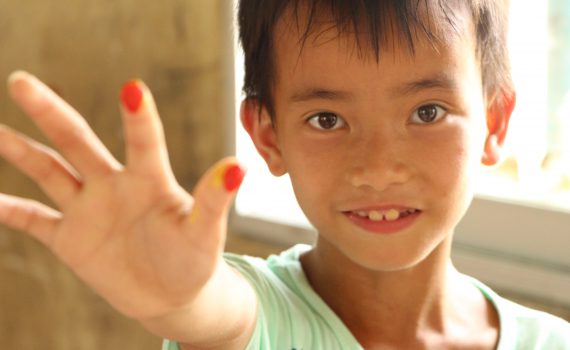Society & Politics

Children of asylum seekers deprived of education rights in Hong Kong
- 2017-12-30
- Society
- The Young Reporter
- By: Candice Wong、Erica ChinEdited by: Cecilia Wong
- 2017-12-30
Education expert and legislator call for conditional working rights of asylum seekers in supporting their own education expenses and daily expenses Isabella Ng Fung-sheung, assistant professor at The Education University of Hong Kong, volunteers at the Hong Kong Society for Asylum Seekers and Refugees. She said only one out of 170 asylum seekers can successfully make a non-refoulement claim so that they are not forced to leave the city. This process might take years, and their children may be deprived of their rights to education during the wait. Asylum seekers are not allowed to work in Hong Kong. Each person receives $1200 a month in food stamps from the government, which is enough for staple food but not much else, according to Dr. Ng. And while their children can go to school for free, Dr. Ng said asylum seekers often find it difficult to pay for school uniforms and books. Although most schools reimburse the parents for their expenses, they do have to pay upfront and then claim the money back with receipts. "Some families are not able to reach here for weekly gathering as they can't afford the transportation expenses," said Dr. Ng. Language barrier is also a major obstacle for young asylum seekers who desire education in Hong Kong, Dr. Ng stated. " The teacher kept telling me that this child cannot speak Chinese, can she understand at least one word of Chinese, if not, this child is so difficult to manage," said Dr. Ng when she recalled her experience in helping child asylum seekers searching for schools. " Local schools accept few non-Chinese speaking children," Dr. Ng says. " I tried to look for a kindergarten for a daughter of an asylum seeker once. She had a Hong Kong identity card, but eight out of ten schools …

Somewhere over the rainbow - How an 8-year-old boy experience China's education gulf
- 2017-12-30
- Society
- The Young Reporter
- By: Caroline KwokEdited by: Cecilia Wong
- 2017-12-30
Every morning at 8:30, the muddy ocher-coloured cottage is blasted with young voices reading aloud textbook passages, so loud that it can be heard across the cement-levelled playground far from the school gate. There are three classrooms in the cottage with no lights but a rickety ceiling fan each. Drawings are repeatedly glued on and ripped off a section of the wall framed with red rice paper. On top, it wrote sloppily "In Celebration of the June First International Children's Day". This is where the eight-year-old Huang Wei-biao goes to school every day with his 22 young schoolmates, a village in the rural area of the East Guangxi province. The nearest town is 45 minutes of serpentine car ride away. One can tell Huang is a diligent student as he reads his textbook with his finger precisely pointing at each word when he pronounces it. One can tell Huang is an assiduous child as the veins of his neck appear every time he utters a word. One can tell Huang is an eager learner as each page of his textbook is torn and curled at the corners. Yet no matter how earnest or smart a student Huang is, he is just one the 13.8 million village primary students in China who are probably receiving education of lower quality than students who study in the urban parts of China. Village schools lack facilities and professionally trained teachers. Pupils do not have classes in other areas such as arts and physical education, let alone school outings. In comparison, the XinXing primary school in the same prefectural city has a multi-story building with a sports ground. There are more than 40 teachers and most of them have received tertiary education. Children's' parents can also find better working opportunities close by and not have …

Food Order Platforms Price Markup Up to 86%
- 2017-12-08
- Society
- The Young Reporter
- By: Susan Gao、Melissa KO、Kenji ChanEdited by: Susan Gao
- 2017-12-08
More than 60% of the meals ordered through online food order platforms were more expensive than restaurants' takeaway, with price markup up to 86%, the Consumer Council said on Wednesday. After 91 trial purchases from nine food order platforms in September, the Council found problems including hidden surcharges, unilaterally order cancellation, late delivery, food leaking and double charges. The prices of over half of the food on four aggregate order platforms such as Foodpanda and UberEATS were about 30% higher than takeaway prices, while all the food on three eatery chain platforms including McDelivery were marked up by 4% to 86% with an average of 30%, said the Council. The Council's Chief Executive Gilly Wong Fung-han said at Wednesday's press conference that they would not advise on prices, and markup was understandable if people accepted paying more for convenience. Ho Chung-yin, a 32-year-old data analyst working in Central said she had used Foodpanda four times and knew the prices were much higher. "I only order online when I don't have time to eat out," she said. Testers of the Council found five out of 13 orders were canceled without remedy when ordering on 51WM, an aggregate platform. UberEATS even listed restaurants that had already folded or were being decorated without any notice, testers said. Customer Service Director of 51WM Dickson Lo told The Young Reporter that order cancellations were all done solely by restaurants, probably because they were understaffed or the locations were too far away. "We cannot improve the problem in the long run," Lo said, "because it is a fundamental problem resulting from restaurant's own uncertainties." The Council urged traders to be responsible and delineate every party's responsibility clearly, and provide means of contacts for inquiries with immediate assistance, while three aggregate platforms still have no contact hotline. …

Yahoo Asia Buzz Awards handed out to "buzziest" icons in 2017
- 2017-12-07
- Society
- The Young Reporter
- By: Wing LiEdited by: Jianne Soriano
- 2017-12-07
The 2017 Yahoo Asia Buzz Awards was held on December 7 2017 at the Hong Kong Cultural Center. Based on search results from Yahoo's search engine, the annual Buzz Awards rewards the "buzziest" icons in the Asia-Pacific region. The awards show this year featured appearances from popular Hong Kong celebrities like Vincent Wong, Chrissie Chau, Kara Wai and Natalie Tong. Some of the notable winners include Hacken Lee, who won the awards for the "Top Buzz Local Male Singer" and the "Top Searched Song of the Year." C AllStar, Dear Jane and Supper Moment also won the "Top Buzz Local Group" award. The main highlight and closing act of the show is K-pop star Samuel Kim, who received the award of the :Most Searched Korean New Singer." He also performed three songs and closed the event. Reported by Wing Li Edited by Jianne Soriano Photos by Jianne Soriano

People not satisfied with new scheme for low-income families
- 2017-12-07
- Politics
- The Young Reporter
- By: Susan Gao、Melissa KO、Kenji ChanEdited by: Susan Gao、Melissa KO
- 2017-12-07
Hong Kong Chief Executive Carrie Lam Cheng Yuet-ngor has introduced several policies to ease the plight of low-income families in her maiden policy address today, while many of those families are dissatisfied and argue for more. The city's first female leader proposed to "significantly enhancing" Low-income Working Family Allowance (LIFA) starting from April 1, 2018. Under the new policy, with a few more requirements being satisfied, the monthly payment for a four-person household with two children will increase by 23% from the current $2,600 to $3,200, said the Chief Executive. Ivan Wong Yun-Tat, the Vice Secretary of Neighbourhood and Worker's Service Centre and the district councilor of Kwai Tsing, said that Carrie Lam has responded to the grassroots' aspiration but "the benchmark duration of working hours for the scheme is still higher than expected." The new scheme requires all family members in a four-person household to have no less than 192 total monthly working hours, whereas Wong said 72 working hours per month is the most ideal amount. An open forum discussing Carrie Lam's first policy address was held in Kwun Tong Methodist Social Service today. It was jointly organised by 20 social welfare concern groups with Wong as one of the organisers. The neighbourhood, several political parties and concern groups turned out en masse the event, urging the government to do more for the disadvantaged groups. Mrs. Lam, a full-time housewife having been received the allowance for several years said she was not satisfied with the scheme because her daughter has autism. She suggested that the government should do more, especially to support those low-income families of a child with special needs. Anthony Wong, the business director of the Hong Kong Council of Social Service, said the families of "N have-nots" tended to benefit the least from the updated …

Hong Kong Pride Parade 2017: Goodbye to LGBTI discrimination
- 2017-11-25
- Society
- The Young Reporter
- By: Li Wing Kiu、Elisa Luk、Japson Melanie Jane、Ezra CheungEdited by: Choy York Borg Paulus、Cecilia Wong、Daisy Lee
- 2017-11-25
The Pride Parade 2017 kicked off at two pm today, with hanging lucky scrolls in Victoria Park, signifying the smoothing out of the path, for people of all sexualities. The slogan for this year's parade is "turn the tide, walk with pride". Gary Fan Kwok-wai, current member of the Sai Kung District Council, believes that sexual minority rights should be legally protected. "Everyone should be equally treated, including sexual minorities," said Fan. Professor Alfred Chan, the chairperson of the Equal Opportunities Commission, said there will be legal consultations concerning transgender rights next year. Professor Chan said everyone, especially the government, should cooperate to achieve equality in society. "Everyone is born equal," said Kwok Ka-ki, member of the Legislative Council. However, Kwok thinks that the road to equality for the LGBTQI community is always not an easy one in Hong Kong.

Lifelong suffering of women in India
- 2017-10-25
- Society
- The Young Reporter
- By: Scout Xu、Maggie LiuEdited by: Lam Ka Sing
- 2017-10-25
Women in India suffer from violence throughout their lives, according to a veteran journalist covering the issue for years. The violence starts from infancy, from infanticide and infancy neglect to domestic violence, said Nita Bhalla, the chief correspondent in South Asia at the Thomson Reuters Foundation, in a forum of Hong Kong Baptist University today. Based in New Delhi, Nita Bhalla works as a foreign correspondent for about 20 years and wins an award for her coverage on human rights. Meanwhile, since females are often considered inferior to males, if a family can only support one child for education, the opportunity always goes to the male ones, resulting in deprived opportunities in education, said Bhalla. About half of Indian women get married under the age of 14, according to a government report, and the youngest was only aged 6, said Bhalla. After they get married, sexual abuse within the family, wife-sharing and domestic violence tend to follow, she said. Six out of ten men admitted they have committed domestic violence, including hitting their wives, confiscating their money and devaluing them, according to a United Nations report. At the end of her talk, she says because there are still many positive stories, she can recover from overwhelming frustrations after witnessing disasters. A famous case of brutality to females is the Delhi gang rape, in which a 23-year-old female student was raped by six men in a bus, resulting in her death and worldwide attention. Under social pressure invoked by the protests, four attackers were sentenced to death by the government, while one of them, who was under 18, was charged with a three-year sentence. "The death penalty can't solve the problem as we find in researches," said Bhalla. "Our main focus should on the change in mindset and how we regard …

Highlights on Carrie Lam's responses in her press conference
- 2017-10-12
- Politics
- The Young Reporter
- By: Sharon PunEdited by: Isabella Lo
- 2017-10-12
Chief Executive Carrie Lam Cheng Yuet-ngor further justified her plans for Hong Kong in a press conference Wednesday afternoon, following the announcement of her first policy address in the morning. Responding to the saying that her policy address highlights only livelihood issues but avoids political matters, Lam said Hong Kong has not had a proper atmosphere for such a discussion yet. Lam mentioned the acts of some legislators that morning in the Legislative Council, which she considered as disrespect, are a sign indicating that the city is not ready for much political discussion. She said political reforms, especially those regarding Article 23 and universal suffrage, could only be progressed when time is suitable. Concerning measures to ease housing problems, Lam said the best way for now is to increase the supply of flat units. She promised to make transparent discussions in the near future to confirm how the schemes can work feasibly in detail. While public doubts if the "Starter Homes" plan could solve pressing issues related to housing soon, Lam clarified that it is more important to provide every the opportunity in purchasing flats. Another focus of Lam's address is regarding to innovation and technology. Lam agreed that the industry in Hong Kong has been lagging behind that in the Mainland for years. Apart from the increase in research and development funding, Lam said she will put in extra effort to this field by supervising the whole process of development herself. Regarding Hong Kong audience booing the national anthem at a football match on Monday, Lam thought the irrational audience are only the minority of the whole. She reaffirmed that Hong Kong is part of China and such acts are considered deeply disrespectful to the home country.

Government plans to provide subsidies for university hostels construction
- 2017-10-11
- Society
- The Young Reporter
- By: Elly Wu、Elisa Luk、Erica Chin、Holly ChikEdited by: Angela Cheung、Daniel Ma
- 2017-10-11
Carrie Lam, the city's Chief Executive, announced in the latest Policy Address the setting up of a $12 billion Hostel Development Fund, offering subsidies for universities to construct student hostels. Lam said the lack of on-campus accommodations could hinder international students from studying in Hong Kong, thus making the local tertiary campuses and learning environment less international. Lam believed that establishing the development fund could speed up the executive procedures. The University of Hong Kong, which has the highest percentage of international students of 39% among all University Grants Committee(UGC) funded universities, accepted less than half of international students who applied for dormitories in the year 2014-2015. Meanwhile, all international students applied for hostels in Lingnan University were accepted. However, only 15% of applicants are international students, which is the lowest among local universities. Hence, the "internationalisation" of a university campus has no direct relationship to the provision of residential halls. The "internationalisation" of a university campus has no direct relationship to the provision of residential halls. "The policy would help to attract more international student only if they are prioritised to apply for on-campus accommodation," said Annie Chan, associate professor of Lingnan University. Kevin Yue, Resident Master of one of Hong Kong Baptist University's halls, pointed out that universities' policies on arranging residential hall units to local and international students affect the effectiveness bringing diversity to the campuses, especially when there is not enough dormitories even for local students. Less than half of the 63 international students studying in Hong Kong Baptist University reached by The Young Reporter said they would study in Hong Kong without a dormitory place Out of 63 international students reached, 48 percent of them claimed that they would come to Hong Kong to study even without a dormitory. "I would still come to Hong …

